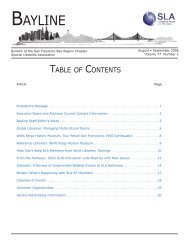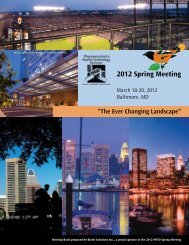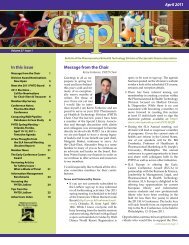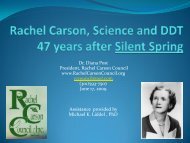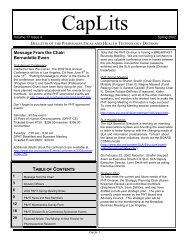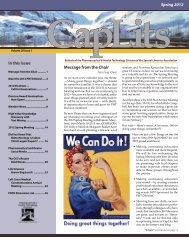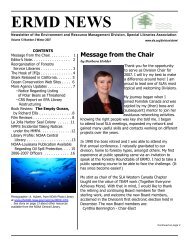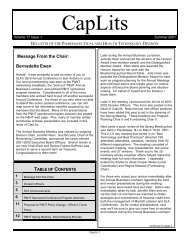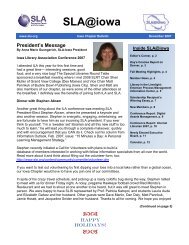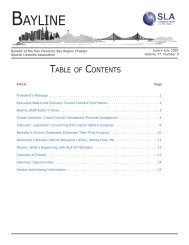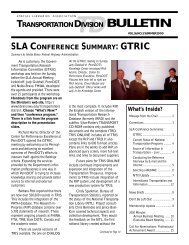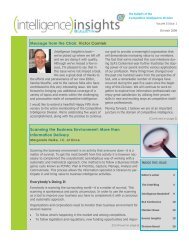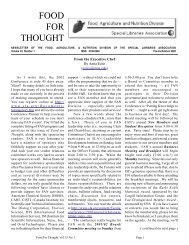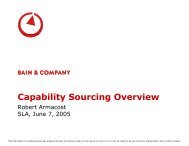Education Libraries - Special Libraries Association
Education Libraries - Special Libraries Association
Education Libraries - Special Libraries Association
You also want an ePaper? Increase the reach of your titles
YUMPU automatically turns print PDFs into web optimized ePapers that Google loves.
As graduate students, teacher practitioners<br />
struggle with utilizing academic resources to<br />
search for research-based articles and monographs<br />
required for courses taken prior to this one and for<br />
upcoming classes. An academic resources module<br />
was created to address these concerns as students<br />
had repeatedly commented that this course was<br />
needed earlier in their program<br />
of study. Subject, keyword and<br />
title searching of books and<br />
multimedia resources are<br />
introduced through the BGSU<br />
(2008) online catalog and the<br />
central OhioLINK (OhioLINK<br />
library, 2008) catalog during<br />
Part One of this module. Part<br />
Two introduces students to the<br />
wealth of resources available<br />
through research databases<br />
purchased locally and<br />
cooperatively within<br />
OhioLINK. Students are<br />
unfamiliar with the notion of fee-based and free<br />
resources available through Internet browsers, and<br />
this becomes another opportunity to draw attention<br />
to the differences between the two and the benefits<br />
of the breadth of scholarship available through the<br />
fee-based databases. ERIC and <strong>Education</strong><br />
Research Complete are demonstrated and students<br />
participate in activities designed to increase their<br />
content knowledge and search strategies. During<br />
the final part of this module, students practice<br />
citing resources (print, electronic and Internet)<br />
using the APA citation style. This is particularly<br />
useful within this course for the citation section of<br />
the WebQuest as well as in future classes that<br />
require research papers.<br />
Final projects are presented to the entire class<br />
during the last day of the course. The teachers<br />
enjoy sharing their work with their colleagues, and<br />
the instructors have an opportunity to view the<br />
overall functionality, design and subject content of<br />
the WebQuest as they are projected for all to<br />
review. Students are encouraged to use the<br />
projects with students in the fall, and the most<br />
accomplished WebQuests are posted on the<br />
Information Literacy WebQuests website<br />
(WebQuests, 2008).<br />
Recently, the course was adapted to include<br />
practical uses of Internet 2.0 technologies as a<br />
mechanism to foster student-to-student and<br />
student-to-teacher collaboration by utilizing social<br />
networking tools for educational purposes. This<br />
module provides an overview of the different<br />
types of Internet 2.0 technologies while offering<br />
hands-on practice with contributing<br />
to a class wiki and class blog.<br />
Students were asked to read a series<br />
of articles on social networking and<br />
the instructional design effects of<br />
Internet 2.0 technologies. The next<br />
step was to respond to the readings<br />
via a discussion board prompt<br />
within Blackboard, the campus<br />
course management system.<br />
Responses indicated that in-service<br />
teachers recognize the need to stay<br />
abreast of the new technologies and<br />
to engage their students in learning<br />
activities to prepare them for the<br />
challenges and opportunities presented in online<br />
environments.<br />
Results and Further Research<br />
The work products generated by the graduate<br />
students in this course are far reaching. They have<br />
the opportunity to improve their personal<br />
information literacy skills while building grade<br />
and content appropriate materials to improve the<br />
information literacy skills of their students.<br />
Additionally, students are helping to connect<br />
resources with teaching and learning. A teacher’s<br />
work day is hectic and all-consuming with little<br />
time left at the end of the day to explore<br />
information resources. The course Information<br />
Literacy for Teaching and Learning affords<br />
teachers the opportunity to discover new resources<br />
to enhance the classroom experience.<br />
To view the work products of students enrolled in<br />
sections of this course, visit the following links.<br />
• Information Literacy WebQuests -<br />
http://www.bgsu.edu/colleges/library/crc/page38734.html<br />
(WebQuests, n.d.)<br />
• 10 Minute Learning Activities -<br />
http://infohio.org/Educator/LearningActivities.html<br />
(INFOhio teacher, 2008.)<br />
<strong>Education</strong> <strong>Libraries</strong>, Volume 31, No. 2, Winter 2008 16



